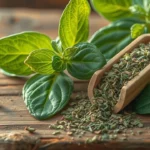Dandelion root, from the Taraxacum officinale plant, with its bright yellow blooms, this seemingly ordinary plant holds a wealth of health benefits within its roots. It has been used for centuries in traditional medicine for its potential to support various aspects of well-being.
However, this hardy perennial has been revered for centuries as a medicinal herb, boasting a long history of use in traditional medicine. Dandelion root is rich in vitamins A, C, and K, along with minerals like potassium and iron. Its broad spectrum of potential benefits, ranging from detoxification to supporting liver health, has sparked renewed interest in recent years. In this article, we’ll dive into the scientific benefits, history, contraindications, and potential side effects.
A Brief History of Dandelion Root
Dandelion has been used in medicine since ancient civilizations. Traditional Chinese Medicine (TCM) and Ayurvedic practices highly regard it for its detoxifying properties. In TCM, people know dandelion as “Pu Gong Ying” and use it to clear heat and toxins from the body, often prescribing it for skin issues like boils and inflammation. In Europe, the plant gained prominence during the Middle Ages as a diuretic and digestive aid.
By the 16th century, herbalists like Nicholas Culpeper praised dandelion for treating liver and kidney disorders. Native American tribes used it for skin, digestive, and respiratory issues. The plant’s extensive use throughout history has paved the way for modern research, confirming many of its traditional applications.
Evidence backed Benefits
Modern science is now catching up with centuries of folk wisdom, with numerous studies suggesting that dandelion root offers significant health benefits.
1. Liver Health
One of the most well-known uses of dandelion root is for liver detoxification and support. The liver is one of the body’s most vital organs, responsible for filtering toxins, metabolizing nutrients, and producing bile for digestion. It offers a natural means to detoxify and enhance liver function. Several key mechanisms contribute to dandelion root’s potential in promoting liver health:
a. Promotion of Bile Production
Dandelion root stimulates bile production in the liver, a crucial process for effective digestion and detoxification. Liver produce the bile to aid in the digestion of fats and the absorption of fat-soluble vitamins (A, D, E, and K). It also helps to eliminate waste products from the liver.
Increased bile production, triggered by the bitter compounds in dandelion root, such as sesquiterpene lactones and taraxasterol, facilitates the breakdown of dietary fats and the removal of toxins. This process helps lighten the liver’s workload, reducing the risk of liver dysfunction due to excessive fat buildup or toxin overload.
Furthermore, by promoting bile flow, it may prevent conditions like fatty liver disease, which is excessive accumulation of fat in liver cells. Research suggests that the enhanced bile flow helps with the emulsification and disposal of fat, reducing fatty liver deposits over time.
b. Liver Detoxification and Protection
Dandelion root may act as a gentle liver tonic, supporting the organ’s detoxifying role. Its active compounds assist in the breakdown of environmental toxins and metabolic waste, aiding in their removal from the bloodstream.
Studies have indicated that it can help protect liver cells (hepatocytes) from oxidative stress. Oxidative stress occurs when there is an imbalance between free radicals and antioxidants in the body, leading to cell damage. This type of stress is a major factor in liver diseases, including hepatitis, cirrhosis, and liver cancer.
Dandelion root’s antioxidant properties, derived from its rich supply of polyphenols and flavonoids, neutralize free radicals, thus protecting the liver from oxidative damage. Some research also suggests that it may help regenerate damaged liver cells, potentially reversing the effects of toxic exposure or inflammation.
c. Anti-inflammatory Action
Inflammation is a common factor in many liver diseases, particularly conditions like hepatitis and cirrhosis, where prolonged inflammation can lead to scarring (fibrosis) and loss of liver function. Dandelion root contains bioactive compounds that have anti-inflammatory effects, which can reduce liver inflammation.
Studies on animals have shown that its extracts can significantly reduce markers of liver inflammation, such as elevated liver enzymes (AST and ALT). This anti-inflammatory action may help prevent the progression of chronic liver conditions and improve overall liver function. By dampening inflammation, dandelion root contributes to a healthier liver environment and enhances the organ’s ability to repair itself.
d. Protection Against Fatty Liver Disease
Non-alcoholic fatty liver disease (NAFLD) has become one of the most common liver disorders in the modern world, largely due to poor diet, obesity, and sedentary lifestyles. This condition occurs when fat accumulates in the liver, leading to inflammation, cell damage, and potentially more serious liver diseases like cirrhosis.
Preliminary research has suggested that dandelion root may help combat NAFLD. The high concentration of antioxidants, such as quercetin and luteolin, can help reduce fat accumulation in the liver. Additionally, its ability of to enhance bile production further aids in the digestion and removal of fats from the liver, preventing fatty deposits from forming.
One study involving dandelion root extracts found that it improved liver lipid profiles and reduced fat buildup in the liver of mice, making it a promising natural remedy for managing or preventing NAFLD.
2. Antioxidant Properties
Dandelion root is rich in antioxidants, which help to neutralize free radicals in the body. Free radicals are unstable molecules that can cause cell damage, leading to chronic diseases and aging. Compounds like polyphenols and flavonoids contribute to its antioxidant effects. These antioxidants may help prevent diseases like cancer, cardiovascular diseases, and neurodegenerative conditions.
3. Anti-inflammatory Effects
Dandelion root have potent anti-inflammatory properties, which could make it useful for managing conditions like arthritis or inflammatory bowel diseases. The polyphenols present in the root help to modulate the body’s immune response, reducing inflammation.
4. Blood Sugar Regulation
Some studies have suggested that it may help regulate blood sugar levels, making it a promising supplement for individuals with diabetes. Its polysaccharides may reduce insulin resistance and improve pancreatic function. However, while these preliminary studies are promising, more clinical trials are needed to establish its efficacy in managing diabetes.
5. Digestive Health
Dandelion root tea is also renowned for its ability to stimulate digestion. It can help alleviate indigestion, bloating, and constipation by increasing bile flow and promoting healthy digestion of fats. The tea’s bitter compounds activate taste receptors that stimulate digestive enzymes, improving the breakdown of food and nutrient absorption.
Drinking a cup of dandelion root tea before meals can prepare the digestive system, enhancing the breakdown of foods and preventing indigestion. For those who struggle with sluggish digestion, this tea acts as a gentle digestive stimulant.
6. Diuretic and Detoxification Properties
Dandelion root tea is a natural diuretic, meaning it increases the production of urine, helping the body eliminate excess water, salt, and waste. Unlike pharmaceutical diuretics, which can deplete the body’s potassium levels, dandelion root tea is rich in potassium, making it a safer alternative for supporting urinary health.
This diuretic effect can help reduce bloating, water retention, and mild edema. Additionally, it promotes kidney function, ensuring that toxins are efficiently filtered out of the blood and excreted through urine.
Usage Forms

Here are some common usage forms of dandelion root and the reasons why each is popular:
1. Dandelion Root Tea
- Why: Tea is one of the easiest and most accessible ways to consume dandelion root. It is widely used for liver detoxification, digestive support, and as a natural diuretic. The tea’s soothing and earthy flavor also makes it a popular choice for those seeking a comforting herbal beverage, especially for promoting liver health and digestion.
- Best for: Daily detox, digestive aid, reducing bloating, and supporting liver function.
2. Capsules or Tablets
- Why: Capsules or tablets are a convenient way to take dandelion root without having to brew tea or deal with the taste. They provide a concentrated dose of dandelion root, making them a good choice for people seeking liver, digestive, or diuretic benefits without the hassle of preparing a tea or tincture.
- Best for: Quick and easy supplementation for liver detox, digestion, and reducing water retention.
3. Dandelion Root Powder
- Why: Dandelion root powder is versatile and can be added to smoothies, soups, or mixed into hot water or juices. It’s favored for its flexibility and allows users to incorporate it into their diet in various ways, especially in recipes or wellness drinks.
- Best for: Adding to smoothies, soups, or other recipes to boost nutrient intake and support liver and digestive health.
4. Root Tincture (Extract)
- Why: A tincture or liquid extract is made by soaking dandelion root in alcohol or glycerin to extract its beneficial compounds. Tinctures are concentrated and can be easily added to water, juice, or taken directly. They are particularly useful for those who need a potent dose and fast absorption.
- Best for: Quick, concentrated liver detox, digestive aid, and those who prefer not to take capsules or tablets.
5. Roasted Root
- Why: Roasted dandelion root is commonly used as a caffeine-free coffee substitute due to its deep, rich, and slightly bitter flavor, similar to coffee. It is a popular option for those looking to cut back on caffeine while still enjoying a warm, robust beverage.
- Best for: Those looking for a coffee alternative with liver and digestive benefits.
Contraindications and Cautions
While dandelion root is generally considered safe for most people, there are certain groups who should exercise caution or avoid it altogether.
a. Allergies
Individuals allergic to plants in the Asteraceae/Compositae family (which includes daisies, ragweed, and marigolds) may experience allergic reactions to dandelion. Symptoms can range from mild skin irritation to more severe reactions, such as anaphylaxis.
b. Interaction with Medications
Due to its diuretic effects, dandelion root may interfere with medications used to regulate fluid balance, such as diuretics or blood pressure medications. It can also interact with medications that are metabolized by the liver, such as certain antibiotics, anticoagulants, and lithium. It’s important to consult a healthcare provider before using dandelion root if you are on any of these medications.
c. Gallbladder and Bile Duct Issues
It stimulates bile production, which is beneficial for digestion. However it may not be suitable for individuals with blocked bile ducts, gallstones, or other bile-related conditions. Increased bile flow could exacerbate these issues, leading to complications.
Potential Side Effects
Though side effects from dandelion root are rare, they can occur in some individuals.
- Digestive upset: In some cases, dandelion root may cause stomach discomfort, acid reflux, or diarrhea, especially when consumed in large quantities.
- Allergic reactions: As mentioned earlier, those allergic to dandelions or related plants may experience itching, swelling, or difficulty breathing.
- Hypoglycemia: People taking diabetes medications should be cautious, as dandelion root may lower blood sugar levels, potentially leading to hypoglycemia.
Conclusion
Dandelion root has a rich history of use in traditional medicine. Modern science continues to validate many of its purported health benefits. From supporting liver health to promoting digestion and regulating blood sugar levels, this versatile herb offers a wide range of potential benefits. However, dandelion root is not without its risks, especially for individuals with certain health conditions or those taking specific medications.
Before incorporating dandelion root into your routine, it’s always wise to consult a healthcare professional to ensure it is safe and appropriate for your individual needs. As herbal medicine continues to gain popularity, dandelion root stands out as a potent, natural remedy. Whether you’re looking to detox, support liver health, or improve digestion, dandelion root may be a valuable addition to your wellness regime.
Disclaimer:
The information provided in this article is for educational purposes only and is not intended as medical advice. Always consult with a healthcare professional before using herbal remedies, especially if you have existing health conditions, are pregnant, or are taking medications. Results may vary from person to person.









